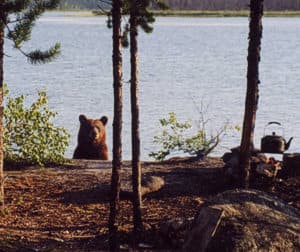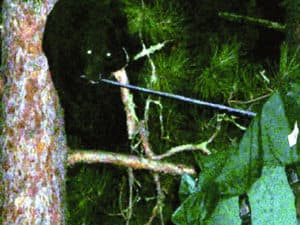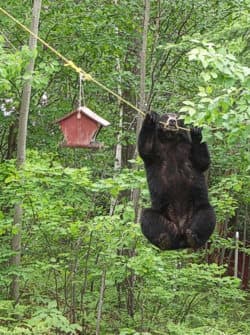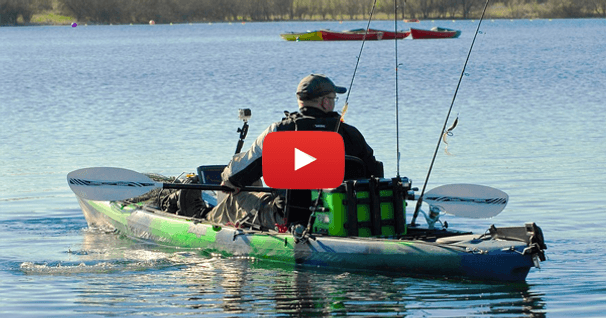How To Bearproof Your Camp
Ask any newcomer to the Allagash Wilderness Waterway or Boundary Waters Canoe Area what he or she fears most about camping out, and you'll hear "bears!" Some folks are afraid they'll be eaten alive; others are worried that a bear will get their food. And backcountry managers offer small consolation, for their advice is often predicated on conditions which no longer exist.
For example, here are some suggestions from U.S. Forest Service publications which are distributed to canoeists who enter Minnesota's Boundary Waters Canoe Area. All except one will get you into trouble. Can you tell which one?
- Hang your food pack from a tree limb that is at least 10 feet off the ground, or suspend it from a horizontal pole set between two trees. Some campsites have a "bear pole" which everyone uses. Please leave the pole as you found it as a courtesy to the next person who occupies your site.
- Don't leave food in your tent, ever!
- Leave tent flaps open so that a bear can walk in and check the place without resorting to brute force.
- This recommendation comes from the canoeing literature: Place food under an overturned canoe. Pile some pots on top to function as a night alarm system.
If you said #2, you are correct. All the rest are wrong, dead wrong! Here's why:

Consider #1: Bears are creatures of habit whose behavior is programmed by past experience. They quickly learn where and in what campers put food. For example, I once saw a black bear tear apart a number four duluth pack that was filled with sleeping bags and tents. This pack had never been used for food, so there was no odor. Past experience robbing other camps had taught this bear that food comes in packs and pack-like objects. It was the shape of the container that attracted the bear, not the smell! Same with tin cans, which they learn about at the local dump. How else can you explain why bears will bite through sealed tin cans which have no food smell on them?
Bears also learn that food packs grow on trees! Certain trees. On popular campsites there is usually only one tree with limbs that are high enough to discourage a determined bear. Invariably, every camper suspends his food pack from this tree. "Soon as it gets dark, I'll climb up there and get it," thinks the bear. Consider this scene which I witnessed some years ago:
A big sow bear and two youngsters waddle into camp and make a beeline right for the "bear tree". The food pack is hanging from a limb, maybe 12 feet up and three feet out. Mama sidles up to the tree trunk, stretches out, and begins to climb. She goes up a few feet then slides down. She's ticked. Real ticked! So she woofs and snaps as she circles the tree, her eyes fixed on the dangling morsel. Meantime, one of the cubs gets wind of the food and starts to climb. Six feet up, it stops and begins to bawl. Seconds later, mama shimmies to the rescue and nudges junior's behind. The kid scoots the remaining distance, stretches out on the limb and hooks a pack strap. Seconds later, cub and food pack fall to the ground and everyone enjoys a tasty meal, courtesy of some camper who "followed the rules."

Moral? Tree your food if you like, just don't use the same tree--or bear pole--as everyone else!
Next, let's check out #3: leave your tent flaps open so a bear can walk in... This one dates back to the 50's when campers cooked fresh foods on open fires within a few yards of their canvas tents. Cotton holds odors tenaciously and a curious bear might just theck them out. So it probably was wise to leave the door flaps open so a bear could look around without tearing the place apart.
But nylon tents and fire don't mix, so now we pitch our shelters--and do all our cooking--well out of range of windblown sparks (and food odor). Modern campers know better than to cook or eat around their tents, and bears know better than to waste their time looking for food in places that in the past have proven unproductive. Closed tent flaps will not discourage a black bear, but they will keep out insects, snakes and the weather. Frankly, I can't think of a more stupid recommendation than this. The feds should've trashed this one long ago.
Now, let's address #4: Place food packs under an overturned canoe and set pots on top as a night alarm system. This idea dates back to the days when campsites were not so heavily used, and before camp bears became "conditioned" to the ways of man. Todays camp bears are well educated. They're not afraid of man, woman or whistle. Clanging pots just add to the fun. Bears aren't very smart, but they will go after what they want. A man told me a big black bear once tried to get at some food stored under his aluminum canoe. When the bruin couldn't connect, he began to jump on the craft. Damage included a broken seat and several pulled rivets. Just think what he could've done to a Kevlar canoe!
Now that we've shown that traditional rules don't work, here are some non-traditional ones that do:
** Break the operant conditioning habit: don't put your food in the same place as everyone else! **
I simply take food packs out of the immediate camp area and place them in the woods, taking care to keep them well away from game trails. Bears don't see very well, especially at night, so as long as there's no food odor, they'll leave things alone.
Case in point: Some years ago, my teenage crew had a prune fight with the lunch leftovers. When the fun ended, the area was littered with wrinkled fruit. About midnight, a sow and cub ambled into camp and began eating the goodies. They came with ten feet of two food packs which were set on the ground just outside the camp perimeter. It was too dark to see the packs so the bears left them alone. Again, let me emphasize that a bear won't get your food if he can't see it or smell it!
All of which brings us to the matter of a clean camp. Leftovers should be burned or buried well away from camp and water. Every spaghetti noodle and grain of popcorn must be gathered and disposed of. The feds are right about number two: bears will tear down your tent to get at food!
Let's review the rules for bearproofing your camp.
- Seal all foodstuffs in plastic so there is no odor.
- Break the operant conditioning habit by putting your food where other people don't.
- Don't keep food in your tent. In grizzly country, the cooking area should be at least 100 yards from where you sleep.
- Keep a scrupulously clean camp and you'll find that what works for bears also works for ground squirrels, mice and birds. Like bears, these animals quickly learn where and in what campers put their food. Ever notice how small animals will hover around a picnic table when people are present? Moving the table won't help, but eating on the ground out of the camp area might.
In summary, to keep your food safe from bears, just follow these rules:
- Keep a clean camp and don't store food in your tent.
- Store odor-free food packs where other people don't. If you tree packs, don't use the same tree as everyone else. Be aware that black bears climb trees! And they climb very well. They are also very adept at getting food packs out of trees. For example, if they see a rope, they'll chew through it, knowing from experience that food falls from the sky when the rope breaks. If a sow is too old or too fat to climb, she'll send the cubs up the tree. She or her cub will almost always get your food. Rangers in western U.S. parks call treed food bags "bear pinata's"!
So, if taking your food out of camp and hiding it in the bushes works, why don't other camping writers and the federal authorities support my methods?

Human stupidity is one reason. A man once asked me, "Cliff, you say take your food out of camp. Where does camp end?" Mostly though, I think it's more a matter of keeping people safe, i.e., "people here, food over there, yonder in that tree". If a bear gets your food it's no big deal; if he gets you, it's a very big deal! Federal authorities need a "formula" they can rely on; one that keeps people and food at a safe distance. No matter that the "food part" doesn't work.
As mentioned, I never hang my packs in bear country. But I keep a scrupulously clean camp, and at night, I put my food in an unsuspecting place. I've lived by my rules for 40 years, and in that time, neither I, nor anyone in my charge, has ever lost food or equipment to any animal. And that friends is the "bear" truth!
Cliff Jacobson is a professional canoe guide and outfitter for the Science Museum of Minnesota, a wilderness canoeing consultant, and the author of more than a dozen top-selling books on camping and canoeing. www.cliffcanoe.com
Related Articles
This question is from imsealin – they asked how long should a kayak be for sea kayaking, and can it be…
More times than not, the reason you aren't catching big fish is not because you aren't doing enough…
A couple of hundred yards from the island, the huge fog-like smudge hanging just above the water’s…
Mention guns and canoe trips in the same breath and some folks are apt to go ballistic. Still, if you're…



